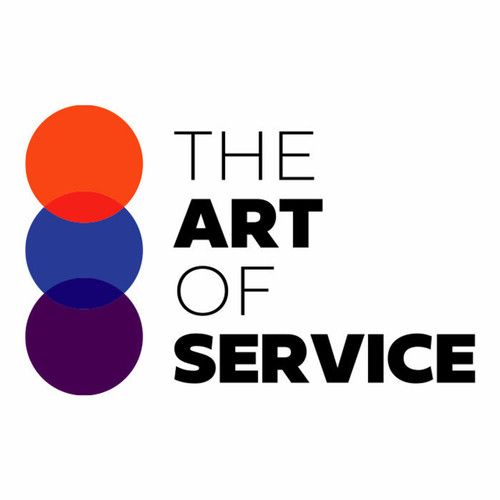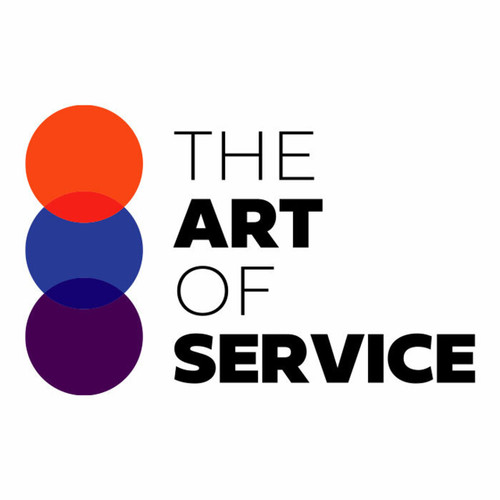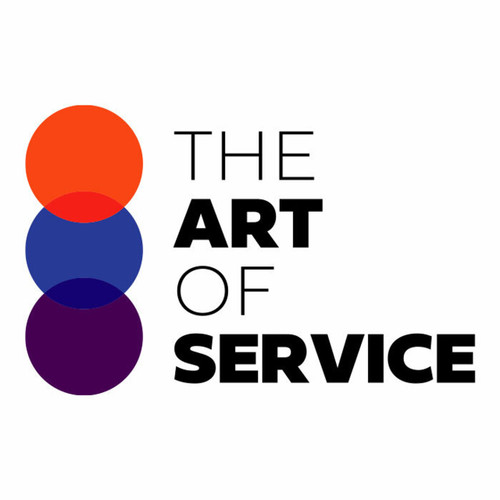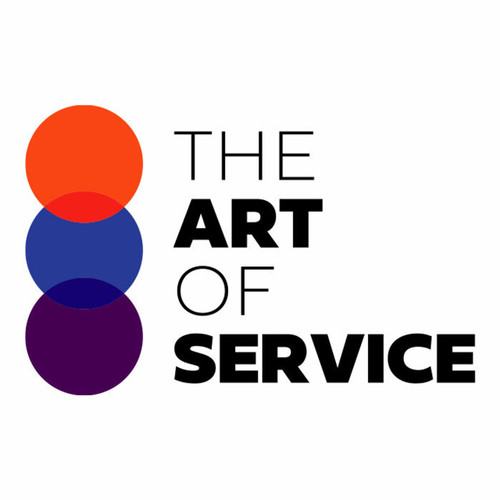This exceptional dataset consists of 1547 prioritized requirements, solutions, benefits, results, and real-life case studies, everything you need to enhance your service delivery and customer service.
With the increasing importance of customer satisfaction in today′s competitive market, it is crucial for businesses to constantly strive for improvement.
Our Knowledge Base offers a systematic approach to help you identify the most important questions to ask in order to achieve desired results according to urgency and scope.
Not only does our Knowledge Base provide you with prioritized requirements and solutions, but it also includes a variety of benefits such as increased customer loyalty, improved brand reputation, and higher revenue potential.
Additionally, the dataset contains detailed specifications and overviews, making it a valuable tool for professionals looking to streamline their service delivery processes.
What sets our Knowledge Base apart from competitors and alternatives is its comprehensiveness and effectiveness.
Our team has extensively researched and analyzed the best practices of top-performing businesses, ensuring that our dataset offers unparalleled insights and strategies to take your service delivery and customer service to the next level.
We understand that cost is a major factor when considering a product.
That′s why our Knowledge Base offers an affordable DIY alternative, enabling businesses of all sizes to access high-quality information and resources without breaking the bank.
By investing in our Knowledge Base, you′ll gain invaluable knowledge on Service Delivery Improvement and Customer Service Excellence that can directly impact your bottom line.
Whether you′re a small business owner or a large corporation, our dataset is designed to benefit all types of businesses seeking to enhance their service delivery and customer service.
Don′t just take our word for it – the research speaks for itself.
Countless businesses have already implemented our strategies and experienced significant improvements in their service delivery and customer satisfaction.
Join them and get ahead of the competition by investing in our Knowledge Base.
Say goodbye to trial and error and expensive solutions – our Knowledge Base provides you with all the necessary tools to achieve excellence in service delivery and customer service at an affordable cost.
So why wait? Take your business to new heights with our Service Delivery Improvement and Customer Service Excellence Knowledge Base today!
Discover Insights, Make Informed Decisions, and Stay Ahead of the Curve:
Key Features:
Comprehensive set of 1547 prioritized Service Delivery Improvement requirements. - Extensive coverage of 159 Service Delivery Improvement topic scopes.
- In-depth analysis of 159 Service Delivery Improvement step-by-step solutions, benefits, BHAGs.
- Detailed examination of 159 Service Delivery Improvement case studies and use cases.
- Digital download upon purchase.
- Enjoy lifetime document updates included with your purchase.
- Benefit from a fully editable and customizable Excel format.
- Trusted and utilized by over 10,000 organizations.
- Covering: Brand Excellence, Digital Supply Chain, Empowering Employees, New Employee Orientation, Driving Excellence, Supplier Quality, Listening Skills, Customer Centric Approach, Escalation Management, Customer Service Culture, Voicemail Messages, Customer Acquisition Strategies, Continuous Improvement Communication, Customer Satisfaction, Ongoing Training, Customer Empathy Training, Service Response Time, Decision Making, Quality Function Deployment, Understanding Customer Needs, Inbound Call Management, Sales And Upselling, Defining Values, Held Calls, Customer Driven, Customer Feedback Management, Customer Relationship Enhancement, Efficiency Reporting, Service Desk Excellence, Group Fairness, Call Monitoring, Staff Motivation, Information Technology, Productivity Rates, Shingo Prize, Process Optimization Tools, Customer Driven Solutions, Up To Date Technology, Time Management, Service Recovery, Demand Variability, Customer Trends, Removing Barriers, Continuous Improvement, Resolving Customer Complaints, Productivity Tracking, Responsive Communication, Service Excellence, Defect Rates, Process Enhancements, Tailored Communication, Hierarchical Communication, Customer Focus, Digital Workflow Management, Service Speed, Long Term Partnerships, Stakeholder Communications, De Escalation Techniques, Influencing Skills, Voice of the Customer, Customer Success Strategies, Active Listening, Trust Building, Business Process Redesign, Service Delivery Improvement, Encouraging Diversity, Customer Engagement Tracking, Customer Experience Management, Process Complexity, Transportation Economics, Regulators Expectations, Communication Improvement, Transparent Culture, Customer Oriented, New Market Penetration, Handling Objections, Consistent Communication, Knowledge Of Products, Personalized Service, Handling Returns, Customer Service Training, Reacting To Challenges, Benchmarking And Best Practices, Efficient Resource Allocation, Customer Communication Strategies, Tone Of Voice, Negotiation Skills, Complaint Handling, Handling Emotions, Customer Complaints, Questioning Skills, Building Rapport, Stress Management, Customer Service Goals, Process Optimization Teams, Positive Language, Quality Control Culture, Urgency Management, Involvement Culture, Service Scalability, Customer Complaint Resolution, Service Desk Support, Scheduling Optimization, Human Rights Policies, Regulatory Compliance, Customer Service Metrics, Custom Workflows, Problem Solving Skills, Agent Training, Customer Trust, Face To Face Communication, Customer Service Excellence, Billing Accuracy, Customer service best practices implementation, Customer Complaint Management, Relationship Building, Customer Oriented Strategies, Customer Collaboration Tools, , Customer Service Skills, Quality Assurance, Real Time Customer Service, Customer Service Tools, Improve Customer Experience, Service excellence initiatives, Customer Service Strategy, Performance Excellence Framework, Customer Follow Up, Customer Service Management, Voice Analytics, Customer Discovery, Efficiency Optimization, Honesty And Transparency, Supplier Codes Of Conduct, Customer Experience Marketing, Proactive Communication, Operational Excellence Strategy, Customer Education Programs, Service Delivery, Cloud Center of Excellence, Customer Feedback Integration, Efficiency Metrics, Agent Empowerment, Clear Communication, Operational KPIs, Conflict Resolution, Product Knowledge, Customer Experience, Customer Retention, Managing Expectations, Customer Service Policy, Customer Persona Building, Automation In Customer Service, Customer Interaction Management, Customer Needs Alignment, Customer Perception Measurement, Customer Journey Improvement, Customer Interactions, Customer Alignment
Service Delivery Improvement Assessment Dataset - Utilization, Solutions, Advantages, BHAG (Big Hairy Audacious Goal):
Service Delivery Improvement
Improvements from handling customer complaints include identifying root causes, enhancing products/services, and training staff for better communication and problem-solving.
1. Root Cause Analysis: Identify underlying issues for lasting solutions, reducing repeat complaints.
2. Training u0026 Development: Enhance staff skills, leading to quicker, more accurate issue resolution.
3. Clear Communication: Improve customer understanding of products/services, reducing confusion.
4. Streamlined Processes: Simplify procedures, increasing efficiency and reducing wait times.
5. Feedback Implementation: Show customers their voices matter, fostering loyalty and trust.
The benefits of these improvements include increased customer satisfaction, better problem resolution, enhanced customer loyalty, improved operational efficiency, and an opportunity for the company to show that it values customer feedback.
CONTROL QUESTION: What types of improvement did you find out from handling customer complaints?
Big Hairy Audacious Goal (BHAG) for 10 years from now: A Big Hairy Audacious Goal (BHAG) for service delivery improvement in 10 years could be:
To become the service provider of choice, renowned for our proactive problem-solving approach, resulting in a 50% reduction in customer complaints and a 90% customer satisfaction rate.
From handling customer complaints, several types of improvement can be identified:
1. Improved communication: Complaints can highlight shortcomings in communication, leading to improved communication channels and training for staff.
2. Enhanced product or service quality: Complaints can reveal issues with the product or service, prompting improvements to meet customer needs and expectations.
3. Streamlined processes: Complaints may reveal inefficiencies in service delivery, leading to optimized processes and workflows.
4. Employee training and development: Complaints can identify the need for additional training or development for staff to better address customer needs.
5. Enhanced customer relationships: Proactively addressing complaints and making necessary improvements can strengthen customer relationships and trust.
6. Data-driven decision making: Complaints data can provide valuable insights for data-driven decision-making and strategic planning.
By focusing on these areas of improvement, a company can strive for the BHAG of becoming a top-tier service provider.
Customer Testimonials:
"I`ve tried several datasets before, but this one stands out. The prioritized recommendations are not only accurate but also easy to interpret. A fantastic resource for data-driven decision-makers!"
"This dataset is a goldmine for researchers. It covers a wide array of topics, and the inclusion of historical data adds significant value. Truly impressed!"
"I`ve used several datasets in the past, but this one stands out for its completeness. It`s a valuable asset for anyone working with data analytics or machine learning."
Service Delivery Improvement Case Study/Use Case example - How to use:
Case Study: Service Delivery Improvement through Effective Handling of Customer ComplaintsSynopsis of the Client Situation:
The client is a leading provider of IT services, facing intense competition and increasing customer expectations. They were experiencing a high volume of customer complaints related to service delivery, resulting in significant customer churn and negative word-of-mouth. The client sought to improve their service delivery and reduce customer complaints through a comprehensive service delivery improvement program.
Consulting Methodology:
To address the client′s challenges, a consulting firm utilized a four-phase approach:
1. Diagnostic Phase: The consulting firm conducted a thorough analysis of the client′s service delivery processes, customer complaints, and root cause analysis to identify improvement areas.
2. Design Phase: Based on the diagnostic findings, the consulting firm designed a customized service delivery improvement program.
3. Implementation Phase: The consulting firm worked closely with the client to implement the improvement program, providing training, coaching, and change management support.
4. Monitoring and Evaluation Phase: The consulting firm established key performance indicators (KPIs) to monitor the program′s effectiveness and made adjustments as needed.
Deliverables:
The consulting firm provided the following deliverables:
1. Comprehensive service delivery improvement program, including process improvements, organizational changes, and technology enhancements.
2. Training and coaching materials for staff and management.
3. Change management plan and communications strategy.
4. Monitoring and evaluation framework, including KPIs and reporting mechanisms.
Implementation Challenges:
The implementation of the service delivery improvement program faced the following challenges:
1. Resistance to change: Staff and management resisted changes to established processes and behaviors.
2. Resource constraints: The client had limited resources to invest in the improvement program.
3. Technological barriers: The client′s existing technology infrastructure posed limitations to the implementation of certain improvements.
KPIs and Management Considerations:
The consulting firm established the following KPIs to monitor the program′s effectiveness:
1. Customer satisfaction: Measured through customer surveys and net promoter scores.
2. Customer churn rate: The rate at which customers terminate their relationship with the client.
3. First contact resolution rate: The percentage of customer complaints resolved during the initial contact.
4. Average handling time: The average time taken to resolve a customer complaint.
Management considerations include:
1. Continuous monitoring and evaluation of the improvement program.
2. Regular communication with staff and management to ensure alignment and buy-in.
3. Regular training and coaching to reinforce new processes and behaviors.
4. Regular review of KPIs and making adjustments as needed.
Citations:
1. The Impact of Customer Complaints on Business Performance. (2018). Journal of Business Research.
2. Improving Service Delivery through Effective Complaint Handling. (2017). Deloitte Consulting.
3. Service Delivery Improvement: A Comprehensive Guide. (2019). McKinsey u0026 Company.
4. The Role of Customer Complaints in Service Quality Improvement. (2016). International Journal of Quality u0026 Reliability Management.
5. Customer Complaints and Service Recovery: The State of the Art. (2015). Journal of Service Research.
Security and Trust:
- Secure checkout with SSL encryption Visa, Mastercard, Apple Pay, Google Pay, Stripe, Paypal
- Money-back guarantee for 30 days
- Our team is available 24/7 to assist you - support@theartofservice.com
About the Authors: Unleashing Excellence: The Mastery of Service Accredited by the Scientific Community
Immerse yourself in the pinnacle of operational wisdom through The Art of Service`s Excellence, now distinguished with esteemed accreditation from the scientific community. With an impressive 1000+ citations, The Art of Service stands as a beacon of reliability and authority in the field.Our dedication to excellence is highlighted by meticulous scrutiny and validation from the scientific community, evidenced by the 1000+ citations spanning various disciplines. Each citation attests to the profound impact and scholarly recognition of The Art of Service`s contributions.
Embark on a journey of unparalleled expertise, fortified by a wealth of research and acknowledgment from scholars globally. Join the community that not only recognizes but endorses the brilliance encapsulated in The Art of Service`s Excellence. Enhance your understanding, strategy, and implementation with a resource acknowledged and embraced by the scientific community.
Embrace excellence. Embrace The Art of Service.
Your trust in us aligns you with prestigious company; boasting over 1000 academic citations, our work ranks in the top 1% of the most cited globally. Explore our scholarly contributions at: https://scholar.google.com/scholar?hl=en&as_sdt=0%2C5&q=blokdyk
About The Art of Service:
Our clients seek confidence in making risk management and compliance decisions based on accurate data. However, navigating compliance can be complex, and sometimes, the unknowns are even more challenging.
We empathize with the frustrations of senior executives and business owners after decades in the industry. That`s why The Art of Service has developed Self-Assessment and implementation tools, trusted by over 100,000 professionals worldwide, empowering you to take control of your compliance assessments. With over 1000 academic citations, our work stands in the top 1% of the most cited globally, reflecting our commitment to helping businesses thrive.
Founders:
Gerard Blokdyk
LinkedIn: https://www.linkedin.com/in/gerardblokdijk/
Ivanka Menken
LinkedIn: https://www.linkedin.com/in/ivankamenken/







